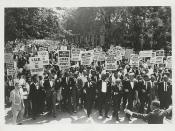For hundreds of years, English has been continuously changing. Words that were unacceptable 300 years ago are now commonplace. English has always had a trademark of being a comfortable language, the language of the common people (MacNeil 143). Change in the grammar and diction of a language is natural, and English is always confronted with changes. Among them are the use of slang, clipped word endings, and new dialects. Some Conservatives do not like changes because they claim that standard English is a perfect language; they do not want to corrupt it. Others simply do not like change. Neither group of Conservatives has any new arguments, and nothing to fear from change.
Slang worries Conservatives the most because it affects the vocabulary of English. American English, especially, is always adding new words to its vocabulary for social, scientific, or artistic reasons. The scientific and artistic words do not bother these people; only the social, or slang, words do.
Slang is usually created by children or teens who seek social status (Morrow 137). Because kids are the source of new slang, some adults look down on it with the assumption that kids are unintelligent and simply rebelling against established English grammar and diction. However, most of the adults did the same thing when they were children. Adults have been frowning on slang for generations (Crystal 104).
Conservatives also look down upon slang because slang is not used by people of high status. If they hear someone speaking in Jive, they will be angry because Jive is not the way that high class people speak. People who do not like slang are usually prejudiced as well. They do not want to hear other ways of talking because it deviates from the way they talk. Also, much slang comes from other...


